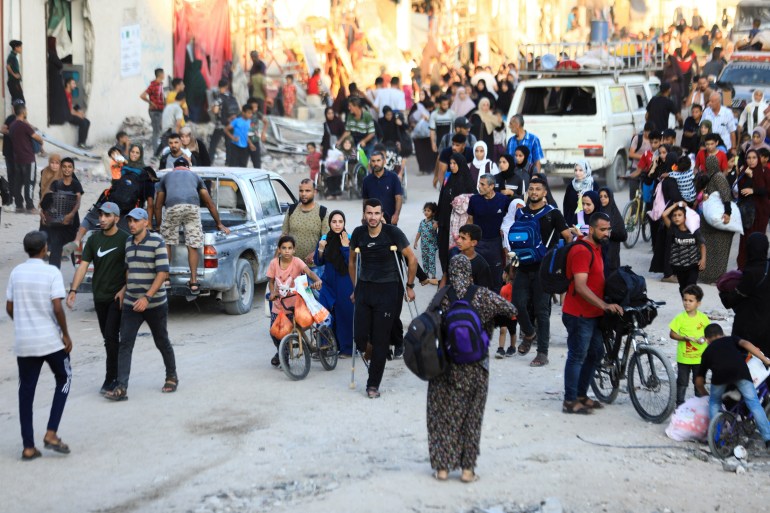Deir el-Balah, Gaza – Rima Khamis, a 34-year-old mother of three, had just gotten to her parents’ house for a visit on Sunday evening.
She lived in the north of Gaza City and had come to the Daraj neighbourhood in the centre to see her sick mother.
Then Israeli orders to leave Daraj, Tuffah and the Old City came like a thunderclap, sowing panic everywhere.
‘Just started running’
“I started trying to call my husband to tell him what happened, to no avail,” Rima told Al Jazeera over phone messages.
Not knowing what was going to happen, she grabbed her children and a few belongings she could find and “just started running towards the north of the city”.
Rima’s mother, who is unwell and cannot move on her own, could not leave with her because she had to wait till her sons could source a wheelchair for her.
As she rushed her children through the street to try to get to her in-laws’ home, Rima registered snapshots of a mass forced displacement.
“Most of the people around me were wandering around, they didn’t know where they were going.
“Families were carrying whatever they thought was most important. A gallon jug of water, a bag of flour, some canned goods … bits of clothing for the children.”
Nobody had a vehicle of any sort, there was no fuel left in Gaza to operate vehicles. So people were running, only able to bring as much as they could physically carry, forced to leave anything that was not vital to keeping everyone alive.
“Mothers were crying and I was crying with them.
“The road stretched ahead, it was so hot, and the children were crying because they had to walk for so long.”
Rima was overwhelmed with despair, turning her eyes up to the sky at one point.
“I said: ‘Oh Lord, if only the Resurrection would happen.’ We couldn’t take it any longer.”
But she made it. She managed to get six-year-old Jamal, four-year-old Mirna and 18-month-old Kinan to their grandparents’ house in the north of the city where they were reunited with their father.

Refusing a life of displacement
Rima and her family had stayed on in Gaza City throughout the Israeli assault on the enclave, refusing to join the wave upon wave of internally displaced people who had fled for safety from Israel’s strikes.
Their determination to stay put cost them dearly, but they were sure that leaving would be worse.
Jamal started to suffer febrile seizures, for which they could not find any treatment, instead comforting the boy through each seizure.
They lived with her in-laws in a home that was so badly damaged it was nearly uninhabitable. But at least it was their home.
As food became disastrously scarce and the bakeries of Gaza City fell silent one after the other – fuel to operate and ingredients running out – Rima’s family felt the bite of hunger set in.
She found herself scouring the markets and talking to various “dealers” to secure food and baby formula at prices she would never have imagined.
But they persevered because they wanted to stay in their homes.
That night, Israeli tanks and armoured vehicles moved in from the southwestern corner of Gaza City, sending even more people fleeing as they tried to avoid aerial bombardment that ringed everything around them in blazing terror.
Alaa Al-Nimr, a 33-year-old mother of three, including an infant, narrated the “horrors” she had been through as a terrible day extended throughout the night.
Alaa and her family had been displaced several times, perhaps 11 times she said, but she was no longer able to recall the details.
They had ended up separated, with Alaa and the children staying with relatives in the Sheikh Radwan neighbourhood and her husband with his parents at a school where thousands were sheltering.
Patients evacuated on their gurneys
When the forced evacuation demand came out, Alaa was in the al-Ahli Arab Hospital with her husband and his two-year-old nephew, who had burns all over his body.
The little boy had lost his entire family in an Israeli bombing the previous week.
“Everyone started running and screaming after evacuation orders were issued for the area,“ she said.
“The medical staff, the injured, and the families, everyone started running. The ambulances were trying to move some of the hospital equipment to another place.
“Chaos … chaos prevailed.”

As people were trying to evacuate, Alaa said, quadcopters hovered overhead, firing directly near the hospital gate and increasing the fear and panic.
“Such a painful scene of mass exodus … there were patients evacuated on their hospital beds with their drips on.
“People were walking aimlessly. My husband picked up his nephew and we went back to my relatives’ house because he’s so young, he has to stay with me.
“I was crying as I watched the people flowing around me, bombing above us and tanks behind us … everywhere. Where to go?”
Once she and the toddler had been delivered to her family’s shelter, Alaa’s husband left to check on his family at the school in western Gaza City.
That night, they found themselves suddenly surrounded by tanks and ran under what little cover the nighttime bombing provided.
“My husband got to our neighbourhood in the early morning of that dawn, with groups of displaced people, mostly families with their kids.
“People were sitting on the sidewalk and in the street. No one has anywhere to go.”
EMEA Tribune is not involved in this news article, it is taken from our partners and or from the News Agencies. Copyright and Credit go to the News Agencies, email news@emeatribune.com Follow our WhatsApp verified Channel





